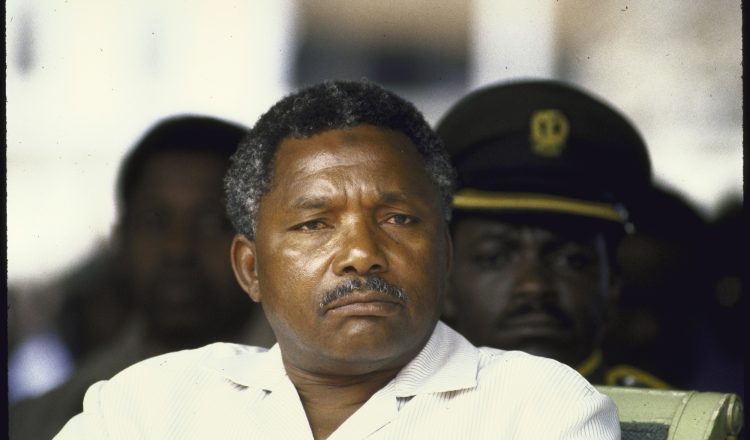Tanzania is in mourning following the passing of former President Ali Hassan Mwinyi, who died at the age of 98. Mwinyi, who served as the country’s president from 1985 to 1995, is remembered as a statesman whose leadership steered Tanzania through a period of significant political and economic change.

Ali Hassan Mwinyi was born on May 8, 1925 in Kivure, which is located in the Coast Region of Tanzania. His father, Mze Juma Mwinyi, was a chief, and his mother, Asha Abdualla, was a peasant farmer. Mwinyi’s parents were not only financially unstable but also led a modest life. He was not the only child in the family, having many brothers and sisters.
Ali Hassan Mwinyi was the first child in the family to start formal education. He attended a local school, where he studied the Quran and the basics of the Arabic language. In 1940, he was admitted to King’s African Rifles where he completed his study on 30th July 1943. After that, his life was taken by serving the colonial government and the first option was to continue working.
However, it was his father who insisted that his son had to further his education. And on his own part, he was attracted by the then well-known school of the Morogoro Secondary School, for he was filled with the spirit of nationalism and the passion for intelligence. He had a broad intellectual interest and this attracted him to a subject combination of history, geography, and English literature.
He also liked to attend Scouts, Wildlife Club, History Club, Geography Club, Sports, and Music. Mwinyi was promoted to be an assistant producer at Ujiji and later on to be the Deputy Regional Agricultural Officer at Tabora.
Inside Tanzania, Mwinyi went to a middle school in Tabora and was a member of an extraordinary group of students who went to classrooms housed in a structure once used as boys’ quarters for the colonial Tabora School of Works. He excelled in a countrywide examination at the end of standard eight (which would have corresponded to a junior secondary school education), obtaining sufficiently high marks to gain acceptance to Tabora Secondary School.
He then moved to Pugu Secondary School in 1956, where he successfully completed the advanced-elected course to become eligible to pursue further studies leading to the advanced certificate of secondary education. After finishing at Pugu in 1959, he enrolled in a three-year course of studies leading to that certificate at the Government established and managed institution, Kibaha Agriculture Standard School.
Having successfully pursued studies at Kibaha, he graduated in 1962 and joined the staff of the same institution as an assistant master before he was eventually invited by the then Ministry of Agriculture and Cooperative to proceed to an overseas agricultural college for training in crop husbandry and management. This specialist training was pursued in a college in the United Kingdom and Mwinyi left Tanganyika for the first time in 1963 and under an arrangement of a colonial contract to serve the Government of Tanganyika for a specified number of years, he studied the two-year diploma course in Agriculture and Management in Nottinghamshire and received his first taste of life in the highly developed world.
However, before the end of his contract period, Mwinyi took the examination for a course and was successful, gaining a national diploma in Agriculture and Management in 1966. In the same year, he left the United Kingdom to return to Zanzibar and the Isles of Unguja and Pemba. And immediately after his return, he was appointed an Estate Manager and given full responsibilities of managing a Government-owned Estate in the southern region of Unguja, known as Kizimbani Estate.
He also served at various levels in different government departments until he retired in 1982. In 1992, soon after the introduction of multiparty democracy, Mwinyi made a record by a voluntary decision to retire from both the Party’s and Government’s top leadership.
Political Career and Achievements
In 1980, Mwinyi was appointed Minister of Labour, Youth Development and Sports. Later in the year, he was appointed Prime Minister by President Nyerere. This is due to the fact that Mwinyi was also a member of Chama cha Mapinduzi (CCM), which was the sole political party in Tanzania. His appointment suggests that he was favored by the political elite and trusted to run the government in an effective manner.
His time as Prime Minister was a period of reform and change, and he sought to do away with the socialist policies that Nyerere initially introduced and open up the market economy. When Nyerere announced his retirement in 1985, Mwinyi was elected to succeed him as Chairman of the Revolutionary Party. Following this position, Mwinyi went on to win the Presidential elections held later in 1985 and became President of the United Republic of Tanzania. Mwinyi enjoyed a long career within politics and spent 10 years as President from 1985 to 1995. He was succeeded by Benjamin Mkapa, who won the Presidential elections held during that year.
Appointment as Vice President
Ali Hassan Mwinyi was appointed Tanzania’s Vice President in 1984. This allowed him to further advance his political career and cement his influence within the ruling party, Chama Cha Mapinduzi (CCM). This appointment was significant as it placed Mwinyi in a good position to succeed Julius Nyerere as president upon his retirement. Part of the reasons for his appointment was the desire and need to inject fresh blood in the government system by pushing young and energetic politicians forward and at the same time to address the shift in the political landscape following the endorsement of multi-party democracy system in the country.
During his time as Vice President, Mwinyi was seen as a loyal and capable assistant to President Nyerere. As a result, his own political campaign to succeed Nyerere upon retirement benefitted from the close ties between the two leaders. Mwinyi’s advocacy for the ruling party to endorse and appoint young politicians into key positions further strengthened his political base, as it broadened his support from different factions within the party and marginalized potential opponents who seemed to maintain the status quo.
His support for leadership reforms, political inclusion and adopting a pragmatic approach towards addressing national challenges also won him much needed and influential support from the senior party members and regional leaders as well as public sympathies. Through his efforts and influence, the CCM agreed to adopt a multi-party system which was formally endorsed during the party congress in 1992, a defining moment in the country’s political history.
Mwinyi successfully led the government’s push for the amendment of the constitution to facilitate the legal and political infrastructure which was necessary in the realization of systems and institutions that would support and sustain multiparty politics. His tireless and robust campaign to win the hearts and minds of the public that indeed, the party’s adoption of multiparty system was not just a populist policy measure but a genuine and commitment towards entrenching meaningful participatory democracy – allowed the CCM to enter into the subsequent general election campaigns with a well-defined image and confidence for a landslide victory.
Transition to Presidency
Julius K. Nyerere, after serving for the maximum two five-year terms, stepped down as president in 1985 in accordance with the constitution. This was a crucial period in the politics of Tanzania and the leadership of the party, CCM, because it was the time for the vice president, Ali Hassan Mwinyi, to assume the presidency. The transition to Mwinyi’s presidency was not easy, not because there was opposition to it, but due to the fact that at that time the party was not well organized and strong enough to meet the challenges of that transition period. The party had just come out of a serious decision to draft a new constitution allowing a multi-party democracy.
There was also a lingering problem of lack of effective and elected party leaders throughout the country at all levels. The outgoing president Nyerere used his wisdom and experience to help the party and his successor to steer the country through the difficulties of that transition period. He led the country as party chairman while Mwinyi was the vice chairman for about three years until the CCM conference in 1990.
As a constitutional and experienced leader himself, President Mwinyi decided to abide by the constitution and did not contest in the 1995 general elections. He retired from politics and remained in his home village in Coast region for the rest of his life, getting involved in farming and other economic and social activities in the area. But he served the nation in various capacities as he had done for many years. For example, he was the chancellor of the University of Dar es Salaam and served in various boards of public institutions.
He also dedicated his time to charity and social services. On 27th November 2016, this great leader, Ali Hassan Mwinyi, passed away leaving the country deeply saddened. He was given a state funeral and was buried in the village of his birth in Coast region. He has gone but the memory of his great leadership remains.
Economic Reforms and Development Initiatives
Mwinyi’s presidency is often associated with his economic reforms and development initiatives. Before becoming president, the Tanzanian economy was facing decline. There were issues such as rural-urban migration, import-dependent production, and low production efficiency. Mwinyi recognized that the socialist economic policies adopted under Nyerere’s administration were not sustainable in the long run.
As a result, he sought and acquired financial aid from international organizations such as the International Monetary Fund (IMF) and World Bank. This marked the beginning of what was to be referred to as the ‘structural adjustment program’ in Tanzania. Mwinyi introduced various policy reforms such as the devaluation of the national currency, removal of price controls, reduction of the civil service, and increase in the private sector.
The ‘no-party’ system under Nyerere’s administration was also abolished in 1992. Mwinyi also allowed the formation of political parties and general elections. Undeniably, Mwinyi’s economic reforms had both positive and negative consequences. On the one hand, his government was able to reduce inflation, stabilize the currency, and improve the balance of payments. There was an increase in export output and national income.
Furthermore, introducing multi-party democracy facilitated political pluralism and led to the expansion of human rights discourse. On the other hand, policy reforms such as the ‘liberalization policy’ led to unemployment and social shock. It also brought about income inequalities and the rise of urban poverty. Mwinyi’s legacy as far as economic reforms are concerned is still under scrutiny. However, it is clear that such reforms set the pace for the radical changes which were to be witnessed under the next president, Benjamin Mkapa.
Foreign Policy and Diplomatic Relations
Mwinyi’s approach in foreign policy was centered on economic diplomacy. He was a firm supporter of regional cooperation in East Africa. Mwinyi sought to lift Tanzania from economic dependence to placing the country into a more competitive position in the international economic environment.
However, internationally, during the early 1990s efforts to build on democratic governance and respect for human rights and social reform had thrown up, in some parts of the world, facts that were contrary in nature to the fresh wind of change blowing. Mwinyi realized only too well that the international climate and mood towards aid and financial support for development was changing in the early 1990s. The end of the Cold War era and the new enthusiasm for economic reforms and progress in the developing countries was creating a global society that was interdependent and where any country that indulged in human rights abuses not only suffered through loss of respect in the eyes of the moral world but would ultimately face financial losses.
Mwinyi, with this in mind, tried to open as many economic doors as he could so that Tanzania was able to gain from whatever was on offer from an international community that was now rife with possibilities of advancement. Mwinyi often sought an international platform on which to promote and enhance sustainable, social and economic development in Tanzania. The President spoke at several diplomatic conferences about issues such as the problems states faced in building and preserving democracy or methods to reinforce the ties of brotherhood and international peace between nations.
Through his speeches, both in Tanzania and abroad, Mwinyi brought to light many of the central issues that concerned Tanzanian development and a national agenda was becoming clear. His links to international financial institutions such as the International Monetary Fund (IMF) and the World Bank were signs that exponents of foreign policy were taking a more prominent role in helping to shape the future development and strategy of Tanzania. Such financial associations paid dividends when major financial development projects in Tanzania, such as the water schemes and health and education programs, received generous external support.
Mwinyi was keenly aware of the role that the political and administrative heritage of Tanzania’s colonial period could play in determining the conduct and policy decisions in his own government during the 1990s. In order to understand the Presidential policies of Ali Hassan Mwinyi in their modern context, it’s essential to recognize the influence that the British colonial administration had in shaping the Tanzanian political framework.
After all, as the transition from colonial to independent rule rapidly took hold on the world stage of the late 1950s and early 1960s, Tanzania was seen as a new child amongst tens of infants at the time crying for freedom from imperialism and the right to govern itself. By appreciating this political infancy, in terms of national identity and recognition, and the early steps Tanzania took to lay down the bedrock for a modern Africa state, it enables one to appreciate the depth and general groundwork of democratizing and modernizing policies in the first multi-party elections later in 1995 and even the far more recent general elections and political climate of today.
His decision marked an end to his continuous leadership role in the Revolutionary Party of CCM (Chama Cha Mapinduzi) and the United Republic of Tanzania. From 1982 to 2001, he graced various international and local balls in the capacity of a retired President and also Special Trustee of the Commission for HIV/AIDS in Tanzania.
- Tags: ali hassan, President, Tanzania





